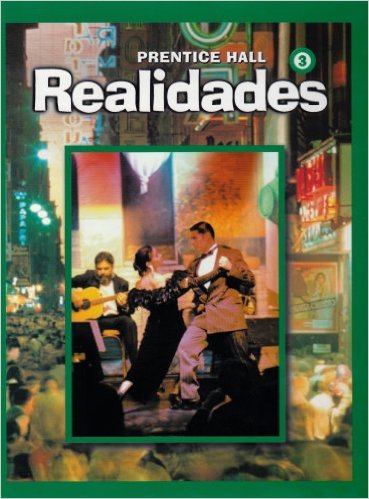
Realidades 3
1st Edition
ISBN: 9780130359681
Textbook solutions
All Solutions
Page 364: Actividad 26
Exercise 1
Step 1
1 of 4
After carefully reading parts of Bernal Díaz de Castillo’s book about the conquest of Mexico, complete the sentences with the imperfect subjunctive of the appropriate verb.
Step 2
2 of 4
The imperfect subjunctive is used to describe an unlikely event; after ojalá; when you are expressing you are making someone do something; to express doubt; to express emotions.
It is used when the main verb is in the preterite or imperfect past tenses.
Step 3
3 of 4
It is formed by taking the *Uds./ellos/ ellas* form of the preterite and replace the ending –ron with the imperfect subjunctive endings (-ara; -aras; -ara; -áramos; -arais; -aran// -iera; -ieras; -iera; -iéramos; -ierais; -ieran).
Result
4 of 4
Fuera
Exercise 2
Step 1
1 of 4
After carefully reading parts of Bernal Díaz de Castillo’s book about the conquest of Mexico, complete the sentences with the imperfect subjunctive of the appropriate verb.
Step 2
2 of 4
The imperfect subjunctive is used to describe an unlikely event; after ojalá; when you are expressing you are making someone do something; to express doubt; to express emotions.
It is used when the main verb is in the preterite or imperfect past tenses.
It is used when the main verb is in the preterite or imperfect past tenses.
Step 3
3 of 4
It is formed by taking the *Uds./ellos/ ellas* form of the preterite and replace the ending –ron with the imperfect subjunctive endings (-ara; -aras; -ara; -áramos; -arais; -aran// -iera; -ieras; -iera; -iéramos; -ierais; -ieran)
Result
4 of 4
Tuvieran
Exercise 3
Step 1
1 of 4
After carefully reading parts of Bernal Díaz de Castillo’s book about the conquest of Mexico, complete the sentences with the imperfect subjunctive of the appropriate verb.
Step 2
2 of 4
The imperfect subjunctive is used to describe an unlikely event; after ojalá; when you are expressing you are making someone do something; to express doubt; to express emotions.
It is used when the main verb is in the preterite or imperfect past tenses.
It is used when the main verb is in the preterite or imperfect past tenses.
Step 3
3 of 4
It is formed by taking the *Uds./ellos/ ellas* form of the preterite and replace the ending –ron with the imperfect subjunctive endings (-ara; -aras; -ara; -áramos; -arais; -aran// -iera; -ieras; -iera; -iéramos; -ierais; -ieran).
Result
4 of 4
Fuera
Exercise 4
Step 1
1 of 4
After carefully reading parts of Bernal Díaz de Castillo’s book about the conquest of Mexico, complete the sentences with the imperfect subjunctive of the appropriate verb.
Step 2
2 of 4
The imperfect subjunctive is used to describe an unlikely event; after ojalá; when you are expressing you are making someone do something; to express doubt; to express emotions.
It is used when the main verb is in the preterite or imperfect past tenses.
It is used when the main verb is in the preterite or imperfect past tenses.
Step 3
3 of 4
It is formed by taking the *Uds./ellos/ ellas* form of the preterite and replace the ending –ron with the imperfect subjunctive endings (-ara; -aras; -ara; -áramos; -arais; -aran// -iera; -ieras; -iera; -iéramos; -ierais; -ieran).
Result
4 of 4
Hubiera
Exercise 5
Step 1
1 of 4
After carefully reading parts of Bernal Díaz de Castillo’s book about the conquest of Mexico, complete the sentences with the imperfect subjunctive of the appropriate verb.
Step 2
2 of 4
The imperfect subjunctive is used to describe an unlikely event; after ojalá; when you are expressing you are making someone do something; to express doubt; to express emotions.
It is used when the main verb is in the preterite or imperfect past tenses.
It is used when the main verb is in the preterite or imperfect past tenses.
Step 3
3 of 4
It is formed by taking the *Uds./ellos/ ellas* form of the preterite and replace the ending –ron with the imperfect subjunctive endings (-ara; -aras; -ara; -áramos; -arais; -aran// -iera; -ieras; -iera; -iéramos; -ierais; -ieran).
Result
4 of 4
Pudiera
Exercise 6
Step 1
1 of 4
After carefully reading parts of Bernal Díaz de Castillo’s book about the conquest of Mexico, complete the sentences with the imperfect subjunctive of the appropriate verb.
Step 2
2 of 4
The imperfect subjunctive is used to describe an unlikely event; after ojalá; when you are expressing you are making someone do something; to express doubt; to express emotions.
It is used when the main verb is in the preterite or imperfect past tenses.
It is used when the main verb is in the preterite or imperfect past tenses.
Step 3
3 of 4
It is formed by taking the *Uds./ellos/ ellas* form of the preterite and replace the ending –ron with the imperfect subjunctive endings (-ara; -aras; -ara; -áramos; -arais; -aran// -iera; -ieras; -iera; -iéramos; -ierais; -ieran).
Result
4 of 4
Supieran
unlock

